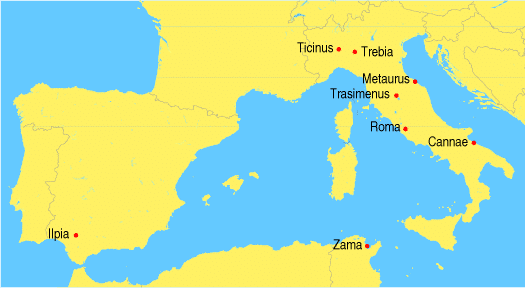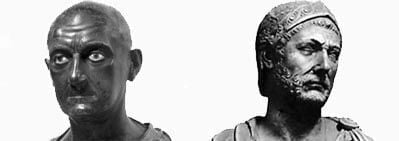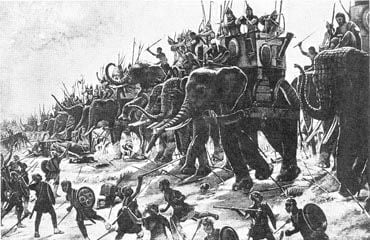Chapters
Battle of Zama (202 BCE) was the great victory of Scipio Africanus over Hannibal, which resulted in the defeat of Carthage in the Second Punic War. The Roman commander used a brilliant tactic that allowed him to exclude from the fight Hannibal’s most dangerous weapon – war elephants.
Background of events
In 204 BCE situation of Carthage in the Second Punic war was already hard, Spain was lost and Masinissa, king of Numidia, changed to the side of Rome after Carthaginians betrayed him and supported his rival Syfax, who was crowned by them as the next Numidian king. Hannibal stayed constantly in Italia, but not as a triumphant winner. Commander survived difficulty in the south of the Apennine peninsula, his army was broken and there was no chance for any support.
Romans were still avoiding a direct clash with him by conducting other activities on the fronts. In this year they took a bold step because the Senate agreed upon a plan of Publius Cornelius Scipio, who wanted to attack directly on Carthage. Soon at the head of a large army, he landed on the African coast. Frighted inhabitants of Carthage expected that sooner than later their city will be attacked by the unbeatable conqueror of Spain.
Warfare in Africa
After their landing Romans started to siege Utica, a city north of Carthage. Then king Masinisa joined Scipio with his troops – light Numidian cavalry. Carthaginians carried out fast mobilization and gathered a large number of people (a few thousand soldiers). Hannon led them against the Romans, but he lost and died during the battle.
The siege of Utica stretched in time and Scipio ordered to raise a fortified camp. His army stayed there during the winter without any essential activities, Carthaginians calmed down and even some of them were thinking that soon Romans will be forced to retreat. In fact, the legionary’s camp was located on a spit jutted out into the sea and Carthaginians managed to bar the way to the mainland. Romans had to find a solution to this problem. Scipio was not going to lose his people during a direct clash and decided to beat the enemy using a trick.
Pretending to make peace and start negotiation in 203 BCE he completely lowered the enemy’s vigilance. Some night he ordered to attack a hostile camp. First riders ignited tents on the camp’s edges. Fire immediately took the entire camp. Hundreds of Carthaginians lost their lives in flames, the rest of them ran straight to the Roman swords, who surrounded this fiery hell. The whole Punic army ( approx 30 thousand people) was destroyed without a battle and without any loss on the Roman side.
Hasdrubal Giskon, a loser from Ilipia gathered with Syphax another army of about 30 thousand soldiers. He stood to fight against Scipio on the so-called Great Fields in the valley of the Bagradas river, but he was completely defeated, many people were lost and others ran away. Syphax escaped to Numidia, but Lelius and Masinissa were after him and soon he was captured. This series of failures put Carthaginian Council in horror. The city was almost deprived of defence and on the horizon smoke from burned villages and cities could be seen. Shortly it was considered that there is only one solution. To Hannibal order of return from Africa was sent.
With news about the presence of the Roman army in Carthage Hannibal landed in Leptis Minor ( today Lemta near little Syrt) far away from Scipio and the Punic capital. In order to gather the new army, he hired men and looked for allies. Roman Senate had awareness of the hopeless situation of Carthage and put up hard conditions according to a peace, which was rejected by Carthaginians. Commander demanded to: give back all lands except Africa, reduce the Carthaginian fleet, and pay compensation of five thousand talents. Both Carthage and Rome agreed upon these conditions. It seemed that war will come finally to an end when suddenly Hannibal appeared. He took with him all his best-survived veterans and shortly after his return to Africa he started to improve the army, Elephants were imported, mercenaries were paid and many inhabitants of Carthage were enlisted in the army. The situation was very tense. Punic people who didn’t like conditions of peace started to believe in victory over the Roman conqueror. Scipio desired to bring Carthaginians even more to their doom. Possible that he wanted to challenge Hannibal in the end. If he defeated him, he would gain immortal fame and ultimately avenge the battle lost in Canny.
Both sides made an impression that they were intentionally seeking an excuse to resume warfare. The cause was found quickly – some day during a storm few Roman transport ships were drowned and Carthaginians collected all loads thrown out by the sea. Scipio demanded their return and when he didn’t receive any answer he took all his army outside the camp Castra Cornelia (on the coast) and started to plunder villages in the valley of river Bagradas. In this way, he wanted to provoke Carthaginians to a major battle as soon as possible. Punic Council sent an army under Hannibal’s command against the Romans. Hannibal set off from Adrymes (now Sousse) and destroyed the military camp in Zama. This battle had to decide how Second Punic War will end.
Power of Rome | Power of Carthage |
Roman army with all its auxiliaries had 29.000 footmen and 6100 horse riders. Even Scipio itself in the very beginning possessed 23.000 excellent infantry and 1500 Roman and Italian horse riders. Masinissa took with him 6000 footmen and 4000 horse riders His forces brought also Numidian “kaida” – Dakamas. | Carthaginian army consisted of practically three different armies, which could cooperate with each other. The first army was based on Celts and Ligurians of Magon, the second was African soldiers so Libyans and Carthaginian citizens, third contained veterans from Italy. In this way, Hannibal collected 36.000 footmen and 4000 horse riders, who were supported by Numidian nobleman Tychaios. Hannibal’s army was complemented by untrained and timid fighting elephants the amount of 80. |
Meeting
The meeting of the two armies took place exactly on October 19, 202 BCE, on the plain near Zama, south of Carthage. Hannibal was aware of the weakness of his cavalry and the poor training of most of the soldiers but accepted the fight. Before the clash, he met with Scipio. The greatest commanders of the time looked at each other for the first time. We know this conversation from Livy’s message, which probably reflects its content well. Carthaginians tried to convince the Romans to make peace, arguing that Carthage had already been defeated and that Scipio’s victories so far and the fact that he, Hannibal, asked for a truce, ensured sufficient fame.
Hannibal was to address Scipio:
[…] Peace once established is a better and safer thing than hoping for victory; that is in your hands, this in the hands of the gods. Do not expose so many years’ good fortune to the hazard of a single hour. You think of your own strength, but think too of the part which fortune plays and the even chances of battle. On both sides there will be swords and men to use them, nowhere does the event less answer expectation than in war. Victory will not add so much to the glory which you can now win by granting peace, as defeat will take away from it. The chances of a single hour can annihilate all the honours you have gained and all you can hope for. If you cement a peace, P. Cornelius, you are master of all, otherwise you will have to accept whatever fortune the gods send you. […]
– Titus Livius, Ab urbe condita, XXX.30
The Roman commander replied:
Our fathers were not the aggressors in the war for Sicily, nor were we the aggressors in Spain, but the dangers which threatened our Mamertine allies in the one case and the destruction of Saguntum in the other made our case a righteous one and justified our arms. That you provoked the war in each case you yourself admit, and the gods bear witness to the fact; they guided the former war to a just and righteous issue, and they are doing and will do the same with this one. As for myself, I do not forget what weak creatures we men are; I do not ignore the influence which Fortune exercises and the countless accidents to which all our doings are liable. Had you of your own free will evacuated Italy and embarked your army before I sailed for Africa and then come with proposals for peace, I admit that I should have acted in a high-handed and arbitrary spirit if I had rejected them. But now that I have dragged you to Africa like a reluctant and tricky defendant I am not bound to show you the slightest consideration. So then, if in addition to the terms on which peace might have been concluded previously, there is the further condition of an indemnity for the attack on our transports and the ill-treatment of our envoys during the armistice, I shall have something to lay before the councils. If you consider this unacceptable. then prepare for war as you have been unable to endure peace
– Titus Livius, Ab urbe condita, XXX.31
The last attempt to make peace has failed. The chiefs returned to their armies and began to form lines.
The main battle
Scipio placed light infantry and Masinissa’s cavalry on the right wing and on the left wing he put Italian cavalry under command of trustworthy questor Caius Laelius. Under his orders were also supposedly 600 Numidian horse riders of Dakamas. The centre was created by armed legionary infantry, and was set in three lines. Footmen were not set in the shape of the chessboard, but troops in the second row stood directly behind the first line of hastatii. After troops of principes best soldiers – triarii – took the position. In this way, in battle order, some spaces were left. Scipio hoped that fighting elephants will fall into a trap there and will not able to damage his army. These spaces were hidden by light cavalry, who had ordered to escape to the rear of the army if necessary.
Hannibal for the first time divided infantry into three parts. The first consisted of 12.000 hired Moors (archers), Balearic slingers, Ligurians and Celts from Magon’s army. Carthaginians formed an experimental first line, which was a mix of archers and infantry. In the second line stood the citizens of Carthage and Libian lieges. Finally the distance of approx. 178 meters after the second-line third part of the army was set. It contained well-trained soldiers, who served under Hannibal during the Italian campaign.
On the left-wing Hannibal placed Numidian and on the right-wing Carthaginian cavalry. At the very front stood 80 fighting elephants.
For some time armies were standing facing each other. The battle was started by the attack of Numidian riders. Finally, Carthaginians made the first important move. At his command elephants went to battle. Dozens of grey animals ran toward the Romans. Legionaries, however, did not look scared and they stood hard in one place. In one moment according to the order of Scipio, they started to shout and hit the shields and trumpeters played at the same time. Some elephants turned back and bumped into the Numidian cavalry of Hannibal inflicting heavy losses. This moment of chaos was used by king Masinissa, who defeated Hannibal’s allies with one effective attack. Other animals ran further crushing many soldiers, but they were thrown with stones and stabbed with javelins and finally escaped from the battlefield. The rest of them ran along the Roman battle line to the right. Stabbed with spears by riders of Laelius, elephants escaped tramming Carthaginian cavalry. Laelius then charged and at once smashed them.
In this way, all of Hannibal’s cavalry was swept away from the field of battle. But Roman cavalry disappeared as well because they chased the remaining. To sum up elephants were not trained well and were scared to attack infantry standing in one formation. Romans suffered small losses because elephants ran through empty spaces between their battle order. The main advantage of Hannibal disappointed him.
Then was time for the battle between infantries. Scipio reorganised his legionaries in normal battle formation and ordered a frontal attack with the main infantry forces. Thousands of Roman soldiers marched on. They stopped in front of the first line of Hannibal’s infantry and threw spears. Many soldiers from the first line were killed. Romans grabbed their swords and attacked before enemies were able to regroup their lines. They were better armed and trained than them. Also, the current course of battle raised their morale, so they defeated the Carthaginians quite fast.
Decimated soldiers were pushed back by victorious Romans. Then the second line of Hannibal consisted of Libian and Carthaginian recruits who threw their spears at the back of those, who were retreating. This drastic step (they supposedly did it because of an order from Hannibal) increased losses, but made it impossible to push them to the second line and confuse its order. They had to retreat to the sides or die at the hands of the Romans. Legionaries pressed further and defeated the second line too. Weak Carthaginian infantry did not manage to stop them and started to retreat chaotically. But veterans forced them brutally to divorce from side to side. Scipio noticed, that the now hostile array was in the shape of one line with the best soldiers in the middle. This line was longer than his and he was afraid to be outflanked, so he ordered to regroup his army. Using the loose structure of array quincunx, he moved przesunął principes sideways and triarii to the wings creating a longer line than his enemy. A fierce battle started. Most of Hannibal’s formations were lost, but his veterans were defending relentlessly.
Suddenly cavalry of Lealius and Masinissa returned from the pursuit. They at once attacked the rear of Hannibal’s army. Punic soldiers found themselves in the lap. After some time they were dispatched and panic broke out. Legionaries attacked them even harder to complete their destruction. When Hannibal saw that nothing will protect him from the defeat he fled with a small group and after 48 hours of endless gallop, they escaped to Adrymes. The rest of his army tried to retreat from the Romans, but only a few managed to do this. Scipio was a winner. His victory was crushing.
Roman army lost 1500 soldiers and Carthaginian 20.000. Fifteen thousand Punic people got captive, most of them heavily injured. Approx. 5000 Hannibal’s soldiers escaped from the field of battle.
Consequences
Carthage, after losing the battle, was no longer able to wage war. In 201 BCE, peace was signed under which the Carthaginians could only keep their possessions in Africa. They could not wage wars without Rome’s consent, and moreover, they were forced to pay a gigantic contribution of 10,000 silver talents in 50 years and had to hand over their entire fleet to Rome, except 10 guard ships, and give hostages as a guarantee to fulfil the conditions of the treaty. The actions of Carthage in Africa were to be guarded by Masinissa, king of Numidia, who assisted Scipio in the battle of Zama.
The fate of Hannibal himself is interesting. For some time he remained in Carthage:
Well, after this as if the last act of his valour, Hannibal took refuge in Hadrumetum and from there was summoned to Carthage. He returned to her in the thirty-sixth year after he had left her as a child. Here in the Carthaginian Senate he openly confessed that he had lost not only this battle but the entire war and that there was no hope of salvation other than peace.
– Titus Livius, Ab urbe condita, IX.35
Ultimately, Roman intrigues forced Hannibal to flee. He took refuge in the court of the Seleukid ruler, Antiochus III the Great. After Antiochus’ defeat in the war with Rome in 189 BCE, he fled to Bithynia, where he committed suicide, drinking the poison he had received from his father and always carried in a ring so as not to fall into the hands of the Romans and be put in a cage during his triumph. Before he died, he said, “Let us now relieve the Romans of their fears by the death of a feeble old man”.
The defeat at Zama marked the end of the strong Carthaginian state. Thanks to the reform of the Roman army by Scipio, it became almost unbeatable from that moment. Rome became the greatest power in the Mediterranean and having no worthy competitors, it began its expansion to become the great Roman Empire in the future.













